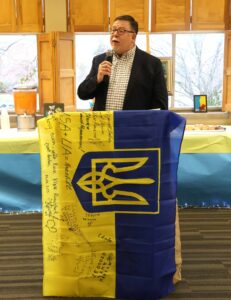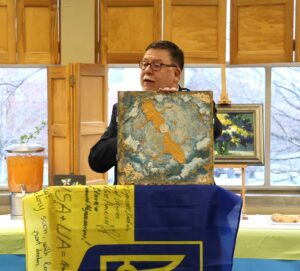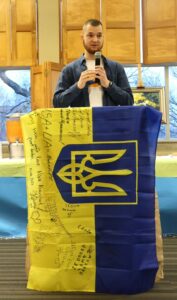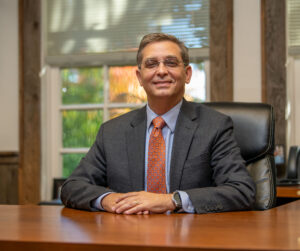GREENEVILLE – Community members will have an opportunity to learn more about the plight of Ukraine through a firsthand account provided by the past president of the Rotary Club of Greeneville and one of the leaders of an organization providing recovery assistance to that nation’s residents.

David Varney speaks in February at the art auction to support Restore Ukraine.
In August, David Varney, the past president, traveled to the war-ravaged country, which has been under attack from Russia for 2 ½ years, and witnessed the explosions from bombings in Ukraine and their aftereffects. Now, he will share what he experienced during a presentation at the Rotary Club meeting Tuesday, Oct. 29, at noon at Tusculum University. Joining him will be Yaro Hnatusko, co-founder of the nonprofit organization Restore Ukraine, who has been leading the fundraising in East Tennessee for relief efforts since the Russian invasion.
The public is invited to attend the presentation, titled “A Front Seat View of Ukraine Under Assault.”
“My purpose of going to Ukraine was to be a witness to the atrocities Russia has inflicted on Ukraine,” Varney said. “What impacted me the most was that I was seeing this type of warfare and damage in the present and living through the experience, not visiting a World War II memorial and learning about bombings that occurred long ago. I was having to watch bombs and their destruction today. This was not a history lesson. It was surreal.”
Varney was in Kyiv, the capital of Ukraine, from Aug. 25-29. He stayed at the Hotel Ukraine, which is located in front of Independence Square, and then toured parts of Kyiv and experienced the culture of this city with the help of two Restore Ukraine volunteers who served as his guides. They are also long-time friends of Hnatusko.
In addition, he met Stan Hnatusko, Yaro’s brother, who is the co-founder of Restore Ukraine and stays in control of operations on the ground. They discussed the efforts of Restore Ukraine.
But the biggest takeaway from Varney’s trip was the Russian bombings and the Ukrainian reaction to them. The bombs he experienced for two days did not land in the center of Kyiv, where he was located, but about 10 miles away. He could hear them ignite and see the smoke from them in Independence Square, but he said the most significant visible damage was on the outer edges of the city. During the other three days he was in Kyiv, bombing took place in other parts of the country.
He only had power for about three hours a day because the Russians hit a hydroelectric plant.

David Varney auctions an item to support Restore Ukraine at an event in February at Tusculum University.
“I was very aware of the circumstances facing me and others in Ukraine,” Varney said. “I had a heightened sense of a fight or flight response with options to do neither. The situation was about as bad as I thought it would be, but in a way it was worse because I was immersed in it.”
As terrifying as the situation was for him, he said the Ukrainians reacted in various ways to what transpired. On one night, the subway station was filled with people seeking shelter from the bombing, but the next day, people were back on the streets and heading to work, determined to keep their country moving forward. He said Ukrainians have adapted to life under siege. Gas stations and restaurants remain open, examples of the nation’s resolve.
He also described how residents of that country can use an app to learn that bombings are coming so they can protect themselves. In addition, a social media site gives them information on the type of bomb that is being dropped, he said. Once the bombing ends, people come out and clean up the destruction.
Originally, Varney planned to spend 21 days in Ukraine, but after five days, he could not bear to witness the devastation any longer.
“I left because I feared for my safety and was not in control of how I could leave the country because of Russia’s actions,” he said. “If I had access to a car, I might have chosen to stay longer.”

Yaro Hnatusko speaks at the art auction in February at Tusculum University.
Yaro Hnatusko is grateful Varney made the trip.
“When you live a considerable distance from a war environment, it can be hard to understand the scope of war’s imprint on a country,” he said. “Through his trip to Ukraine, David has a much fuller comprehension of the destruction Russia has caused and will be able to convey to people the real need for action today to address the dire situation the good people living there have encountered. I welcome the opportunity to join him for this presentation and provide additional context on the humanitarian crisis facing Ukraine.”
The Rotary Club and the university have been intimately involved in supporting Restore Ukraine. In February, Tusculum hosted an art auction fundraiser in the Clem Allison Art Gallery with proceeds going to Restore Ukraine in support of that organization’s efforts to provide $1,000 vouchers to Ukrainians whose residences were damaged during the winter. In 2023, the Rotary Club held a similar fundraiser on campus.
Since the Russian invasion, Restore Ukraine has provided more than 650,000 pounds of food, 198,000 pounds of personal hygiene products and 1.76 million pounds of construction materials. It has also rebuilt 59 apartments, with 75 more now under construction; renovated two bomb shelters; and shipped six containers of winter clothes and medical supplies from the United States.
In all, Restore Ukraine has provided more than 2.8 million pounds of supplies and assisted more than 50,000 Ukrainians since February 2022.
Dr. Scott Hummel, Tusculum’s president, has been heavily connected to the Restore Ukraine movement as well. In addition to participating in the auctions, he was one of the people to speak in a video encouraging donations to Restore Ukraine. He highlighted how the donations are helping people rebuild their residences and live in a safe and warm environment. He said he is proud to support Restore Ukraine and the people it serves.

Dr. Scott Hummel
“Tusculum’s mission calls for our faculty, staff and students to be civically engaged and demonstrate a caring Christian environment,” Dr. Hummel said. “Supporting the residents of Ukraine, who have shown so much character and courage in the face of horrifying circumstances, is essential. I am proud to back the Restore Ukraine movement. I encourage people in the community to attend David and Yaro’s talk so they can clearly know the challenges Ukrainians face and how we can support them in their time of need.”
The presentation by Varney and Hnatusko will take place in the Hurley Dining Room, which is adjacent to the Tusculum cafeteria in the Scott M. Niswonger Commons. Attendance for the presentation and the lunch accompanying it is free. To help the club plan space for the event, please RSVP to Varney at dev2063@gmail.com.
To learn more about Restore Ukraine, please visit https://restore-ukraine.org/. Additional information about the Rotary Club of Greeneville is available at https://www.facebook.com/GreeneRotary/. People can access further details about the university at www.tusculum.edu.


